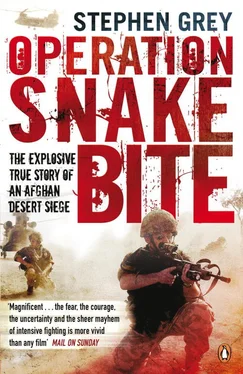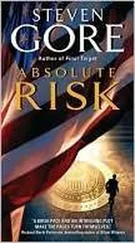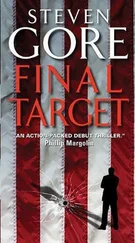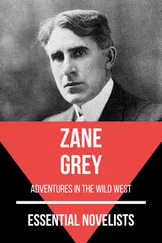Over the winter, the British had claimed the agreement was working, and that the Taliban were staying out of the town. A million dollars’ worth of reconstruction projects were earmarked to support the agreement. And a new police force – that the locals approved of – was due to get trained.
McNeill had been briefed on the deal at the British Embassy in Washington. Then on his way out to Afghanistan he had got a request to stop by in London and was briefed again to say what a good deal it was. But McNeill was sceptical. As far as he was concerned the Taliban and their allies, the drugs bosses, had moved back in within days. When he got to Kabul, Karzai had told him bluntly that the deal was a failure and claimed he’d had nothing to do with it.
McNeill was now getting word of something new going on down in Helmand with the Brits, something that was causing tension between them and President Karzai. After Karzai’s phone call, he asked an intelligence officer if he knew who the Taliban leader from Musa Qala was that Karzai was talking about. He found some way to avoid the question. Intel people were good at that.
Gereshk district centre, 6 October
To the Guards officer the civilian official looked like a native. He spoke the language. He wore a turban, the long cotton pyjamas and a woollen waistcoat. And he had a wild, scraggly beard. His hair was ginger, but then Afghans came in many shapes and sizes. Perhaps this was an Uzbek from the north of the country, perhaps the lost child of a Russian soldier.
Captain Rob Sugden had not been in Afghanistan long when he first saw this strange figure. As a member of the Coldstream Guards – the battalion that was broken up during this deployment and sent in different directions – Sugden had been put in charge of working with the police force in the town of Gereshk.
Aged twenty-seven and the son of a half-Kenyan father who had served in the army, Sugden was a high-flyer. He had joined after an Oxford University geography degree. He had been an officer now for just over three years and had come to Afghanistan after a spell of guarding Buckingham Palace. Nothing in his background could have prepared him for Helmand.
Sugden was present today at a strange meeting. On one side were a couple of colonels, the Afghan chief of police, some British officials and then this strange ‘Uzbek’. Sugden was informed that he was in fact Irish. And that his name was Michael Semple.
The party of people had come down to meet two tribal leaders, Mullah Qassim and Mullah Bashir. The meeting was important because, until a few weeks back, they and their men were Taliban. Now they were known simply as ‘the Group’.
Sugden got a fill-in from his commanders. ‘We were told they were indeed ex-Taliban and this was the beginnings of a reconciliation programme,’ he remembered. But the details were scarce. Semple struck Sugden as very laid-back and ‘not fazed by rank or anything like that’. Obviously, he had spent a lot of ‘time with generals or presidents… he was very at ease, a very kind of calm guy. He didn’t so much lead the proceedings, but it was quite obvious that he was central to them. And they kind of came in the whirlwind, stayed about two-and-a-half hours, and then they all disappeared again.’
Sugden was told to do some monitoring of the Group, ‘check in with them occasionally’ and see they did not get into any major dramas. He was told that Mullah Qassim would be mainly dealing with his contacts in Kabul, principally Michael Semple and one of Semple’s Afghan contacts. ‘He seemed to be the voice of this reconciliation from the ex-Taliban side,’ said Sugden.
Mullah Qassim, it transpired later, had just two business cards in his wallet: Michael Semple’s and that of Sir Sherard Cowper-Coles, the British ambassador.
Talking to the Taliban was a sensitive issue. In private, almost everyone thought that it needed to happen urgently. But, in public, they were wary. The politicians called it ‘reconciliation’ and stressed it was ‘not negotiation’. If the Taliban wanted to come forward and talk about laying down their weapons, then great.
The British were the most keen on discreet contacts. Talking with the enemy was how the British did business in countering rebel forces. They had done it in Malaya with the Communist guerrillas; they had done it in Oman with the Dhofar tribesmen who backed the Communists; and they had done it with the IRA in Northern Ireland. The doctrine was simple: ‘Divide your enemy. Engage with those who can be reconciled. Kill or capture those who cannot.’
In Afghanistan, the British knew, there was an honourable tradition of switching sides. A tribe might be your brutal enemy one day and then be your ally the next. When the Taliban had swept to power in Kabul in September 1996, it was not only through fighting. One warlord after another had decided to join their cause. Likewise, when the Northern Alliance toppled the Taliban in 2001, it came about when key strongmen across the country, enticed by CIA dollars, decided to switch sides again.
Ever since they had come to Helmand, the British had been engaged quietly in a discreet programme of contacts with the Taliban. What lay behind that was an early assessment that the ‘enemy’ fighting NATO soldiers consisted not just of hardened ideologues but ordinary tribal Afghans who, if they might not accept the presence of foreign troops, might ultimately come to accept the Afghan government.
When a truce was struck with the elders of Musa Qala in 2006 to enable British forces to withdraw, commanders privately knew they were talking, among others, to local Taliban commanders. But, apart from covering a necessary pull-out, their hope was to use these talks to help separate out these ‘tribal Taliban’ from the more extremist elements based in Pakistan who opposed the deal.
As General Sir David Richards, the NATO commander at the time of the truce, told me: ‘This was a real local initiative and, yes, some of them were Taliban, some of them weren’t. It all depends on your definition of Taliban.’
Brought up in Dublin and Belfast and with an Irish passport, Michael Semple had moved to the region some twenty-two years earlier after he met his future Pakistani wife at Sussex University and they settled in her country. He first came to Afghanistan in 1989 – just after the Soviets had left – and began working for the British charity Oxfam.
Over the years, Semple became fluent in the languages, both the Pashtu language of the south and the Persian dialect, Dari, used in the western provinces and in big cities like Kabul. He began very early on to adopt local dress. It was practical; it put people at ease; and most seemed to regard it as a mark of respect.
By the time the Taliban were evicted from Kabul at the end of 2001, there were few foreigners left who had such deep knowledge of the troubled country that Afghanistan had become, or such a fat contacts book. By then, he was working as a political officer for the United Nations, along with his close friend the Northern Irishman Mervyn Patterson, who, like Semple, had now been working in the country for years.
One former British diplomat and author Rory Stewart, who knew Afghanistan well, would describe Semple and Patterson as ‘two of the best political officers in the country… There is no shortage in Kabul of charmers with flattering analyses and tickets home. But there are few such genuine and constant friends of Afghanistan.’
When one Irish ambassador met Karzai to present his credentials, the president told him: ‘Michael knows every Afghan.’ At the time, it seemed like a compliment to Semple. But, for the president, someone with such deep knowledge was also someone to fear.
Читать дальше












